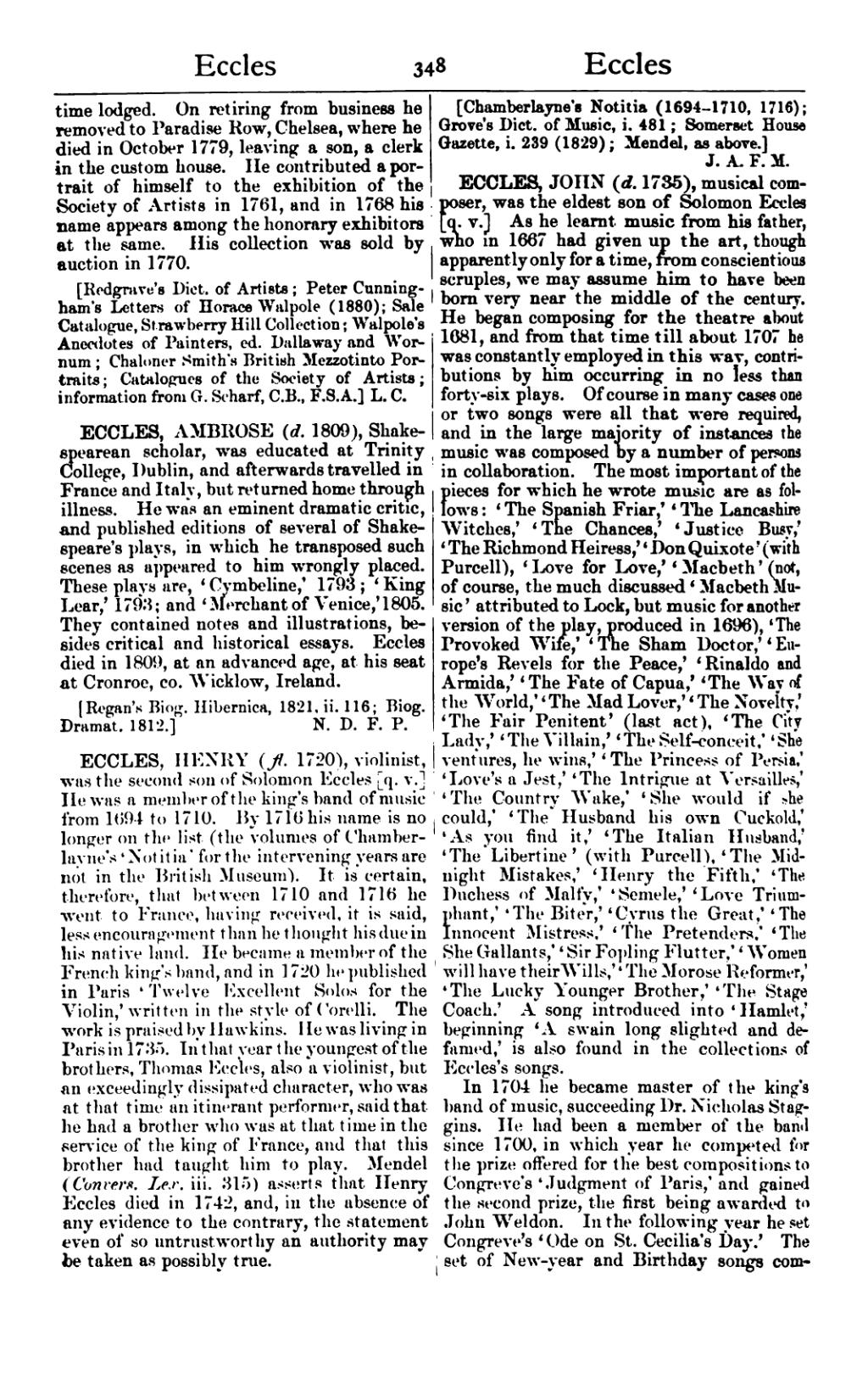time lodged. On retiring from business he removed to Paradise Row, Chelsea, where he died in October 1779, leaving a son, a clerk in the custom house. He contributed a portrait of himself to the exhibition of the Society of Artists in 1761, and in 1768 his name appears among the honorary exhibitors at the same. His collection was sold by auction in 1770.
[Redgrave's Dict. of Artists; Peter Cunningham's Letters of Horace Walpole (1880); Sale Catalogue, Strawberry Hill Collection; Walpole's Anecdotes of Painters, ed. Dallaway and Wornum; Chaloner Smith's British Mezzotinto Portraits; Catalogues of the Society of Artists; information from G. Scharf, C.B., F.S.A.]
ECCLES, AMBROSE (d. 1809), Shakespearean scholar, was educated at Trinity College, Dublin, and afterwards travelled in France and Italy, but returned home through illness. He was an eminent dramatic critic, and published editions of several of Shakespeare's plays, in which he transposed such scenes as appeared to him wrongly placed. These plays are, ‘Cymbeline,’ 1793; ‘King Lear,’ 1793; and ‘Merchant of Venice,’ 1805. They contained notes and illustrations, besides critical and historical essays. Eccles died in 1809, at an advanced age, at his seat at Cronroe, co. Wicklow, Ireland.
[Regan's Biog. Hibernica, 1821, ii. 116; Biog. Dramat. 1812.]
ECCLES, HENRY (fl. 1720), violinist, was the second son of Solomon Eccles [q. v.] He was a member of the king's band of music from 1694 to 1710. By 1716 his name is no longer on the list (the volumes of Chamberlayne's ‘Notitia’ for the intervening years are not in the British Museum). It is certain, therefore, that between 1710 and 1716 he went to France, having received, it is said, less encouragement than he thought his due in his native land. He became a member of the French king's band, and in 1720 he published in Paris ‘Twelve Excellent Solos for the Violin,’ written in the style of Corelli. The work is praised by Hawkins. He was living in Paris in 1735. In that year the youngest of the brothers, Thomas Eccles, also a violinist, but an exceedingly dissipated character, who was at that time an itinerant performer, said that he had a brother who was at that time in the service of the king of France, and that this brother had taught him to play. Mendel (Convers. Lex. iii. 315) asserts that Henry Eccles died in 1742, and, in the absence of any evidence to the contrary, the statement even of so untrustworthy an authority may be taken as possibly true.
[Chamberlayne's Notitia (1694–1710, 1716); Grove's Dict. of Music, i. 481; Somerset House Gazette, i. 239 (1829); Mendel, as above.]
ECCLES, JOHN (d. 1735), musical composer, was the eldest son of Solomon Eccles [q. v.] As he learnt music from his father, who in 1667 had given up the art, though apparently only for a time, from conscientious scruples, we may assume him to have been born very near the middle of the century. He began composing for the theatre about 1681, and from that time till about 1707 he was constantly employed in this way, contributions by him occurring in no less than forty-six plays. Of course in many cases one or two songs were all that were required, and in the large majority of instances the music was composed by a number of persons in collaboration. The most important of the pieces for which he wrote music are as follows: ‘The Spanish Friar,’ ‘The Lancashire Witches,’ ‘The Chances,’ ‘Justice Busy,’ ‘The Richmond Heiress,’ ‘Don Quixote’ (with Purcell), ‘Love for Love,’ ‘Macbeth’ (not, of course, the much discussed ‘Macbeth Music’ attributed to Lock, but music for another version of the play, produced in 1696), ‘The Provoked Wife,’ ‘The Sham Doctor,’ ‘Europe's Revels for the Peace,’ ‘Rinaldo and Armida,’ ‘The Fate of Capua,’ ‘The Way of the World,’ ‘The Mad Lover,’ ‘The Novelty,’ ‘The Fair Penitent’ (last act), ‘The City Lady,’ ‘The Villain,’ ‘The Self-conceit,’ ‘She ventures, he wins,’ ‘The Princess of Persia,’ ‘Love's a Jest,’ ‘The Intrigue at Versailles,’ ‘The Country Wake,’ ‘She would if she could,’ ‘The Husband his own Cuckold,’ ‘As you find it,’ ‘The Italian Husband,’ ‘The Libertine’ (with Purcell), ‘The Midnight Mistakes,’ ‘Henry the Fifth,’ ‘The Duchess of Malfy,’ ‘Semele,’ ‘Love Triumphant,’ ‘The Biter,’ ‘Cyrus the Great,’ ‘The Innocent Mistress,’ ‘The Pretenders,’ ‘The She Gallants,’ ‘Sir Fopling Flutter,’ ‘Women will have their Wills,’ ‘The Morose Reformer,’ ‘The Lucky Younger Brother,’ ‘The Stage Coach.’ A song introduced into ‘Hamlet,’ beginning ‘A swain long slighted and defamed,’ is also found in the collections of Eccles's songs.
In 1704 he became master of the king's band of music, succeeding Dr. Nicholas Staggins. He had been a member of the band since 1700, in which year he competed for the prize offered for the best compositions to Congreve's ‘Judgment of Paris,’ and gained the second prize, the first being awarded to John Weldon. In the following year he set Congreve's ‘Ode on St. Cecilia's Day.’ The set of New-year and Birthday songs com-
